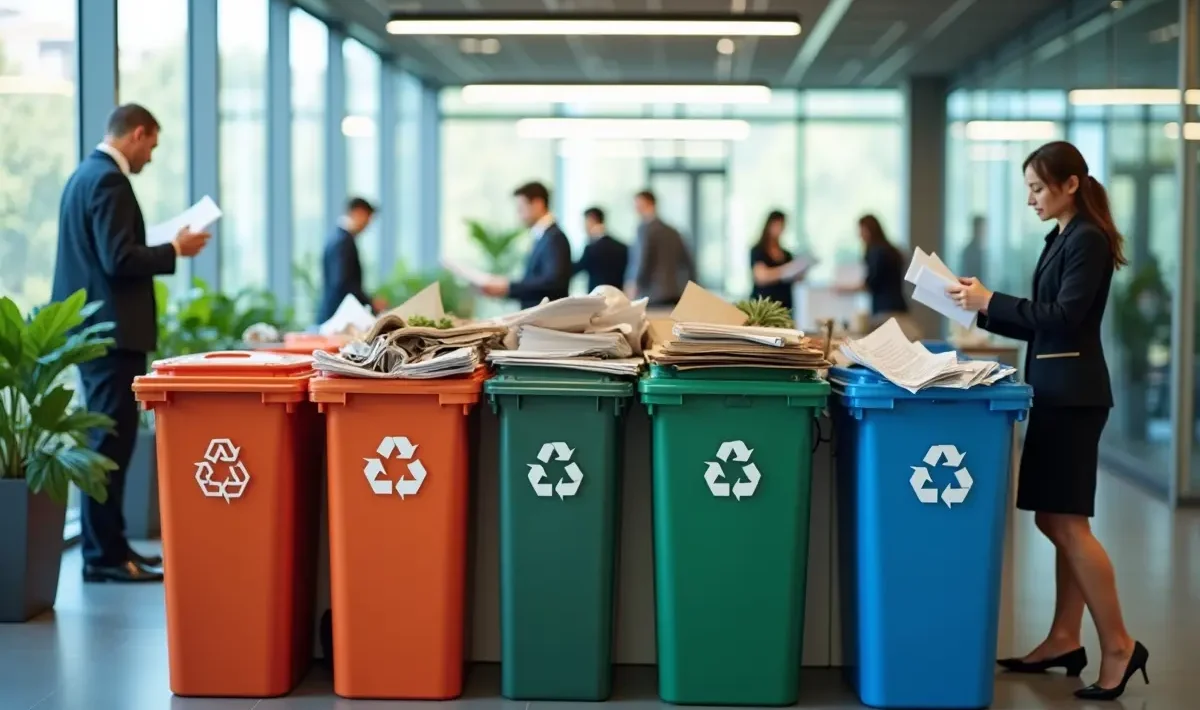Managing waste at your company isn’t just about ticking boxes for compliance; it’s about creating a cleaner, more sustainable future while keeping your business running smoothly. You might already be recycling paper or minimising plastic use, but are you doing enough?
Start with an Audit
Before you can improve, you need to know where you stand. A waste audit is the best place to begin. This is a process where you evaluate the waste your company produces to understand its types and volumes. You’ll want to take a close look at:
- Types of waste – Is it mostly paper, food, plastics, electronics, or hazardous materials?
- Amount of waste – How much are you actually producing on a daily, weekly, or monthly basis?
- Waste sources – Which departments or activities are the biggest contributors to your waste?
This audit will give you a clear picture of where you’re doing well and where improvements are needed. Once you know what you’re dealing with, you can take targeted actions to cut down on waste.
Prioritise Reduction Over Disposal
The key to excellent waste management is focusing on reduction before disposal. It’s not just about finding better ways to throw things away; it’s about generating less waste in the first place. Here’s how you can start:
Rethink Your Supplies
Look at the materials and products your business uses regularly. Are there greener alternatives that produce less waste? Switching to reusable or recyclable products can significantly cut down the waste you generate. For example, if your office still uses plastic cups or single-use coffee pods, now might be the time to switch to more sustainable options.
Encourage Digital Solutions
Going paperless might seem like a cliché, but it’s still one of the most effective ways to reduce waste. Encourage your team to rely on digital documentation and cloud storage. Electronic signatures, for instance, can replace printed contracts. Not only does this cut down on paper waste, but it also streamlines processes and saves time.
Recycle More Efficiently
Recycling is a no-brainer, but how well is your company really doing it? It’s easy to have good intentions and still fall short. For instance, are your recycling bins properly labelled? Are employees well-informed about what can and can’t be recycled? A small educational campaign in the office can make a big difference in reducing contamination in recycling bins.
Another idea is to look into specialised recycling services for electronic waste or hazardous materials. Regular recycling programmes might not cover these items, so you may need to partner with a company that can handle them.
Get Your Employees Involved
Your waste management habits aren’t going to improve unless everyone is on board. Getting your team involved isn’t just beneficial—it’s essential. Here are some tips to ensure your employees are part of the solution:
- Make it easy – Place clearly labelled recycling bins in convenient locations, so employees don’t have to go out of their way to recycle.
- Educate regularly – Organise workshops or send out monthly tips to keep waste reduction top of mind. You could even bring in a waste management expert to talk about how each individual’s actions contribute to the bigger picture.
- Incentivise good behaviour – Consider setting up a rewards system for departments that reduce their waste the most. Small perks can go a long way in motivating staff.
Partner with a Waste Collection Firm
This is where the real difference can be made. A professional waste collection partner isn’t just a company that comes to pick up your rubbish—they can be a valuable ally in managing your waste more effectively. They have the expertise in waste collection in London and can help you identify the best practices for disposal, recycling, and even waste reduction.
When choosing a waste collection firm, make sure to find one that aligns with your sustainability goals. Some firms offer additional services like waste audits, reporting on your waste reduction progress, and even guidance on improving recycling rates.
Also, ask about the end-to-end journey of your waste. Is it going to a landfill, or are there more eco-friendly options, like composting or energy recovery? Having this knowledge empowers you to make better choices and take responsibility for your company’s environmental impact.
Embrace a Circular Economy Mindset
A circular economy is all about designing out waste and keeping materials in use for as long as possible. Instead of following the traditional ‘take, make, dispose’ model, a circular economy encourages companies to think in cycles. Here’s how you can adopt this mindset:
- Repurpose materials – Instead of throwing things away, consider how they can be reused within your business. For example, could old furniture be refurbished instead of replaced?
- Choose suppliers wisely – Work with suppliers who are committed to sustainability and who offer take-back schemes or use recycled materials in their products.
- Donate when possible – Before you throw away unwanted items, see if they could be donated to a charity or community organisation.
Track Your Progress and Celebrate Wins
It’s easy to let waste management initiatives fizzle out if no one’s keeping track. Regularly reviewing your progress is essential to staying on course. Set measurable goals, whether it’s reducing landfill waste by 25% in a year or increasing your recycling rate. Keep an eye on those goals and celebrate your wins.
When you hit a milestone, don’t just give yourself a pat on the back—make sure everyone in the company knows about it. Celebrating achievements helps keep the momentum going and reinforces the importance of what you’re doing.
Waste Less, Gain More
Improving your company’s waste management habits isn’t just good for the environment—it’s good for your business too. You’ll save money by reducing the amount of waste you produce, create a healthier workplace, and enhance your brand’s reputation as an environmentally responsible organisation. Plus, when you reduce waste, you’re helping to create a future where resources are valued and protected.

